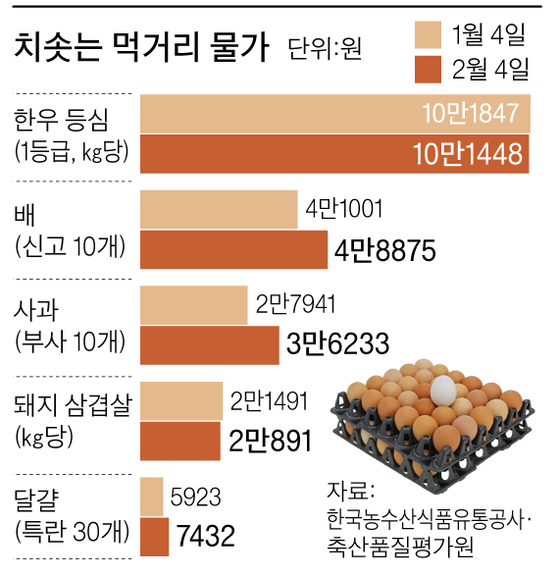With the Lunar New Year coming a week ahead, the rise in food prices is seldom falling. Although the government is importing eggs and releasing agricultural and marine products stockpile, it is predicted that the burden of shopping carts will be relieved only after the Lunar New Year.
1st grade Korean beef surpassed KRW 100,000 per kg
Yong-beom Kim, Vice Minister of the Ministry of Equipment, “Efflation”
To expand egg import and fruit supply
According to the Ministry of Agriculture, Food and Rural Affairs on the 5th, the consumer price of one egg (special egg) (30 pieces) rose to 7432 won on average nationwide. This is a 43.3% increase from the previous year. Egg prices are skyrocketing last year due to the spread of highly pathogenic avian influenza (AI) and increased demand for holidays. Chicken was 5868 won per kilogram, up 15.9% from the previous year, and duck meat also recorded a 36.1% increase at 15,057 won.

Graphic = Reporter Park Chun-hwan [email protected]
In February, the rise in prices of holy goods, which rises in turn, is remarkable. Korean beef sirloin (grade 1) rose to 101,448 won per kg (based on 4 days). The price of Korean beef sirloin surpassed 100,000 won for the first time in June of last year as demand for home food increased due to the spread of the new coronavirus infection (Corona 19) and emergency disaster assistance was provided to all the people. Since then, the price of Korean beef, which has gone up and down the 100,000 won mark, has temporarily dropped to 90,000 won at the end of January and is rising again in February.
The rise in fruit prices is even greater. In particular, the average price of 10 apples (adverbs) was 3,6233 won, an increase of 84.7% compared to the previous year and 7.2% this month alone. The pear (report) price is recorded at 48875 won per 10 pieces.
On this day, the government held a meeting of the public-private joint council for stabilizing the prices of new products such as eggs, discussing measures to expand the supply of agricultural and livestock products. Kim Yong-beom, the first vice minister of the Ministry of Strategy and Finance, said, “The rise in egg prices is having a big impact, so that the price burden of agricultural and livestock products is changed to egg flation rather than agflation. If so, we will actively promote additional income.”
Deputy Minister Kim continued, “We plan to expand the supply of apples and pears, where demand is concentrated on New Year’s Day, to a level that is twice as high as that of the ordinary year.” I will prepare for action.”
Experts predicted that the government’s measures to expand supply could help reduce temporary supply and demand anxiety, but fundamentally, the’table price’ would be caught only when problems such as highly pathogenic AI are resolved. Kim Dong-hwan, professor of the Department of Trade and Distribution at Anyang University (Chief of the Institute of Agricultural Food Research), said, “In the case of domestic eggs, there are many killed eggs, so it takes a lot of time to recover the existing supply. This will not continue.”
An official of the National Statistical Office also said, “It was found that the increase in prices of agricultural and livestock products played a large part in the rise in the total consumer price this year.” said.
Sejong = Reporter Seongbin Lim [email protected]
